Amid Covid-19 Is it a good time to refinance your home loan now (2020)?
One after another came a series of events that impact worldwide since 2019, crossing into 2020. First was the US-China trade war, where both giants imposed tariffs over hundreds of billions worth of goods on each other.
Then the outbreak of 2019 novel coronavirus disease, officially named as COVID-19 in February 2020 by World Health Organization (WHO). It has since claimed ten of thousands of innocent life and hit heavily on tourism, travel, manufacturing, transport, the hospitality industry, and even consumer spending.
While still amid COVID-19, Saudi Arabia initiated a price war with Russia, causing a significant fall in the oil price, which causes the ongoing global stock market crash.
Then again. Rapid acceleration on the infected cases of COVID-19 worldwide, which has now become a pandemic causing WHO to raise the global risk assessment level to Very High and causing many countries to start implementing border lockdown rules either on the traveler or between states within a country.
With the panic and fear around, US Federal Reserve slashes the interest rates for the second time in less than two weeks on Sunday, 15th March 2020, to help soften the impact of the US economy caused by COVID-19.
It is for the second time that the FED slashes rates at an emergency meeting since the 2008 financial crisis. It affects the Singapore Interbank Offered Rate (SIBOR), which took reference from the US Federal Fund’s rates and some other connected economies and exchange rates.
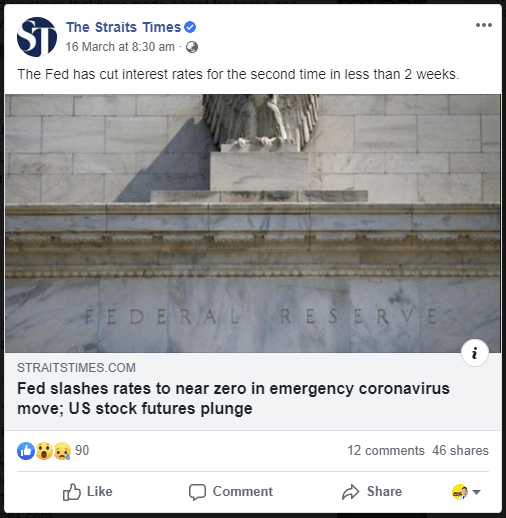
So, what is SIBOR?
It is a reference rate used by the banks in Singapore when lending unsecured funds to a borrower in Singapore wholesale money market. It is widely used by most banks in Singapore to offer SIBOR-based home loan packages and remain one of the most popular home loan packages amongst consumers.
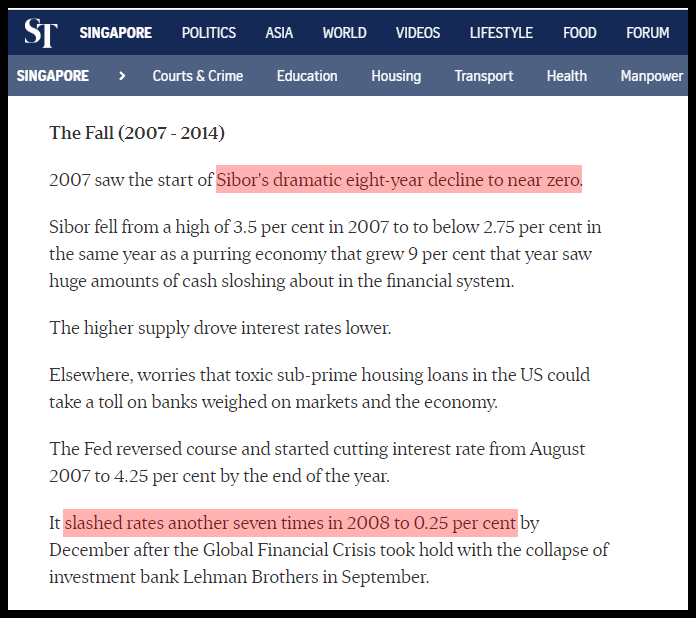
During the 2008 global financial crisis, Sibor falls drastically and remains near zero for eight years before it recovers slightly for two years but still at below 1.5% mark. During this decade, property owners enjoyed very attractive SIBOR-pegged interest rate before it starts to pick up in 2018 and reach to it peak in June 2019 for 1-month SIBOR at 1.887% and 3-months SIBOR at 2.006%
1 Month SIBOR VS SOR TREND (Last 2 Years)
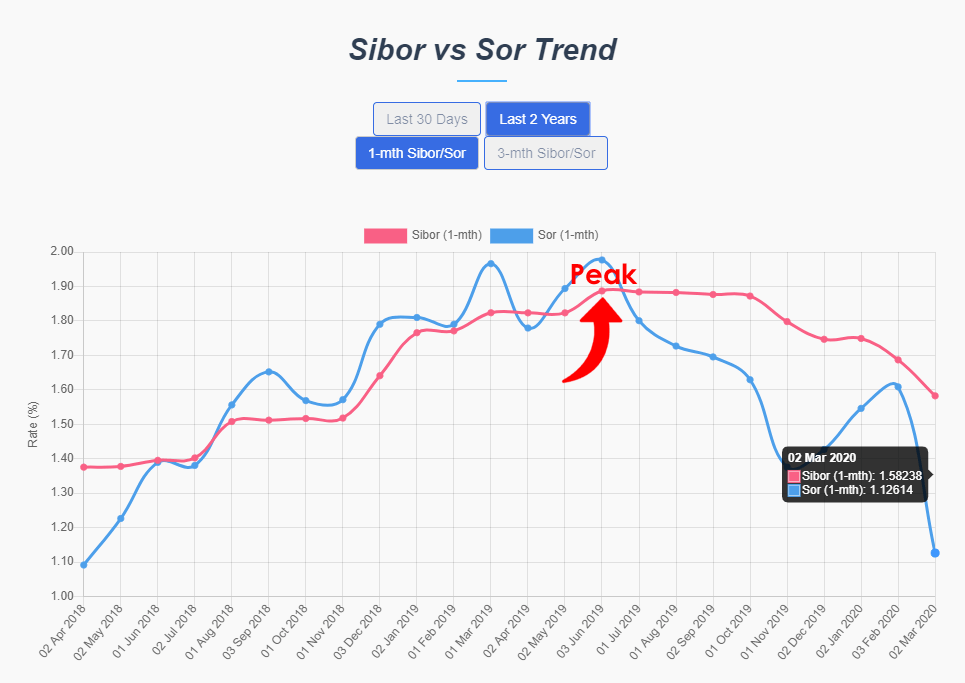
3 Month SIBOR VS SOR TREND (Last 2 Years)
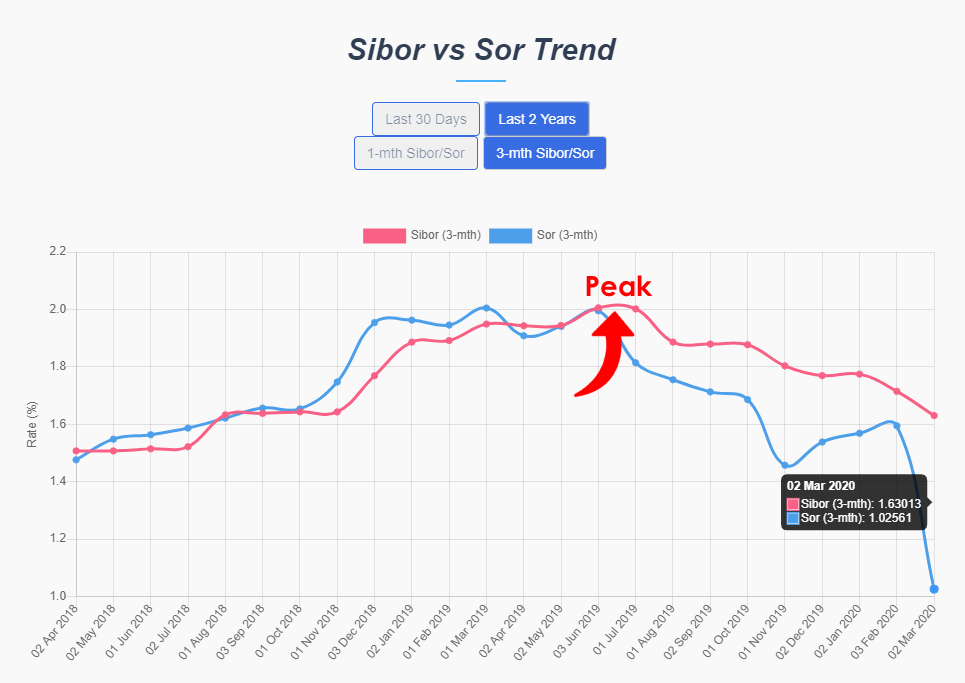
In 2019 cross into 2019, many property owners saw the rise of interest rates, fearing that a hike in interest rates may occur. Thus many went in to sign the fixed rates package, as high as 3%. But never to know that due to the series of events that impact worldwide since mid-2019, SIBOR starts to decline and dived to 0.988% for 1-month SIBOR and 0.99% for 3-month SIBOR on 17 March 2020.
Let take a close up look at the past 30 days 1-month and 3-months SIROR trend as well.
1 Month SIBOR VS SOR TREND (Last 30 Days)
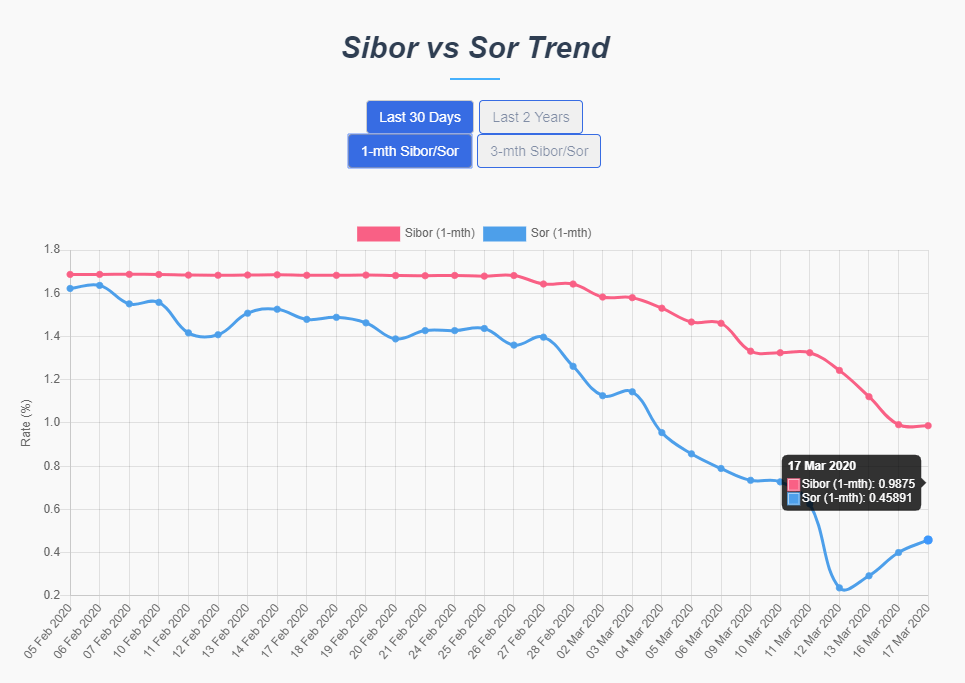
3 Month SIBOR VS SOR TREND (Last 30 Days)
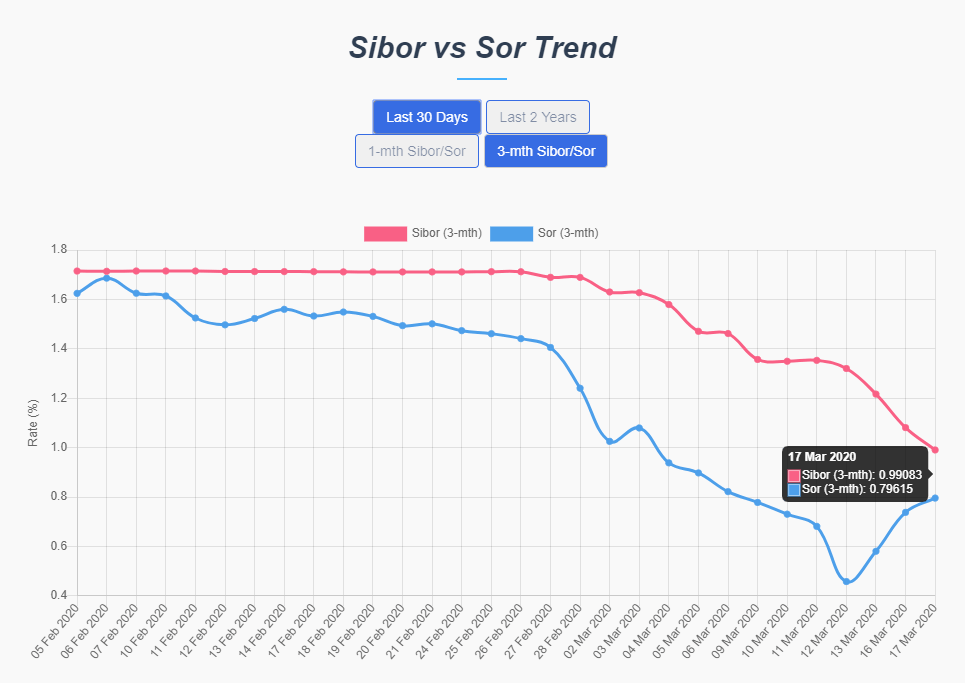
Now that the SIBOR rates fall to almost all-time low again, is it the right time for property owners to refinance or reprice their home loan package if they are paying on the high rates now?
But you will question. Will the interest rate continue to drop further?
There are various home loan packages that the banks offer. It has a wide range from a fixed rate to floating rate etc.
The fixed rates usually cater to property-owner who want a safe and steady rate, which they do not need to bother and worry about the rate increases.
Unlike floating rate, if you think that the interest rates will continue to drop further, you can opt for floating rates to ride on the advantage if the interest rates fall further. On the other hand, if the interest rates rise, you will pay for the higher prices. But from historical trend estimation, the interest rate is unlikely to hit an all-time high within the usual two years lock-in period.
An example, after I have suggested to my client Mr. and Mrs. Lim that they should do something about their home loan package. Their current outstanding home loan amount is about $850,000, going at a 2.88% interest rate with a balance 21 years loan tenure. Before refinancing their home loan, their current monthly installment is $4,499 per month.
Monthly Installment at $4,499 Before Refinancing
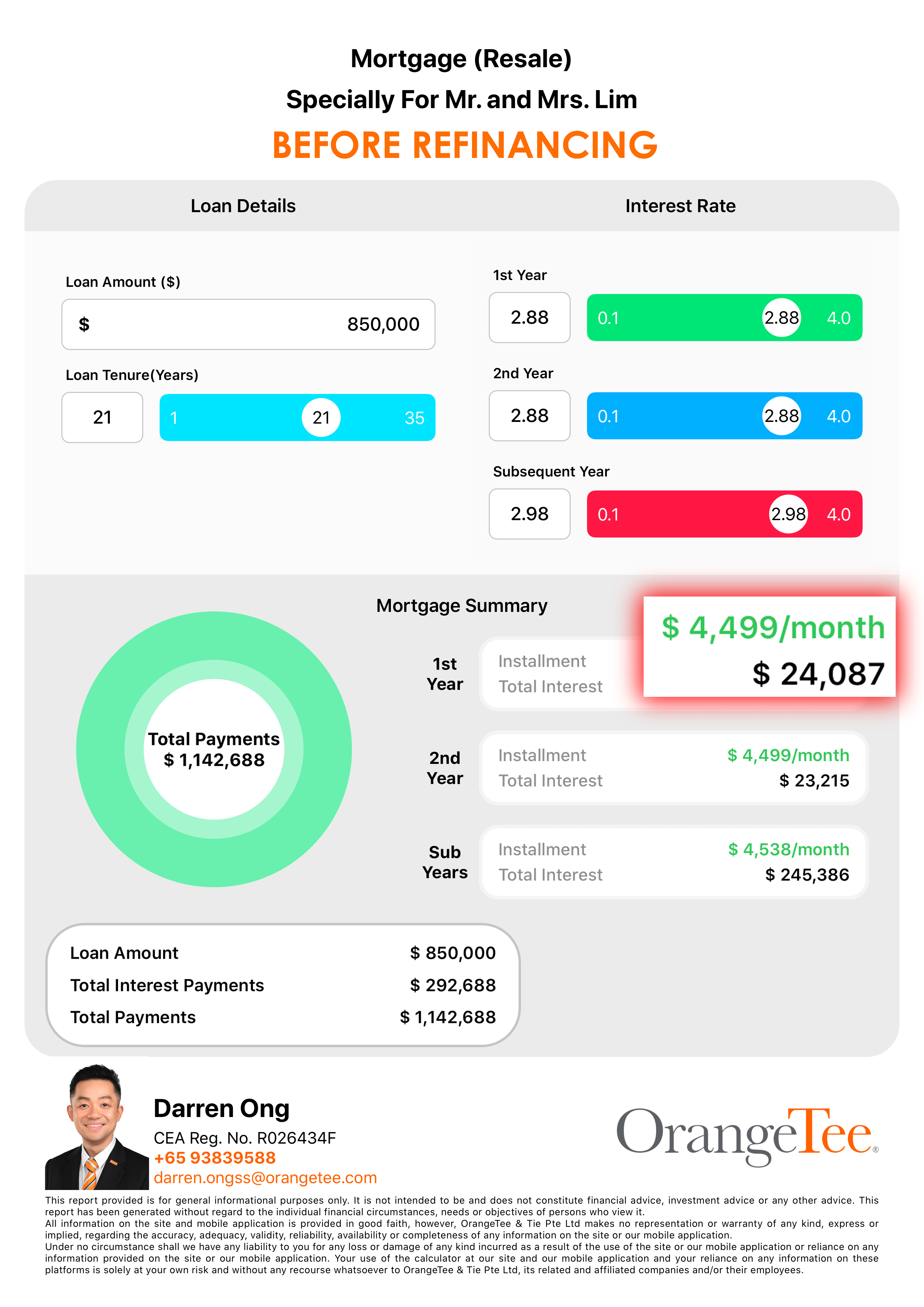
Monthly Installment at $3,891 After Refinancing
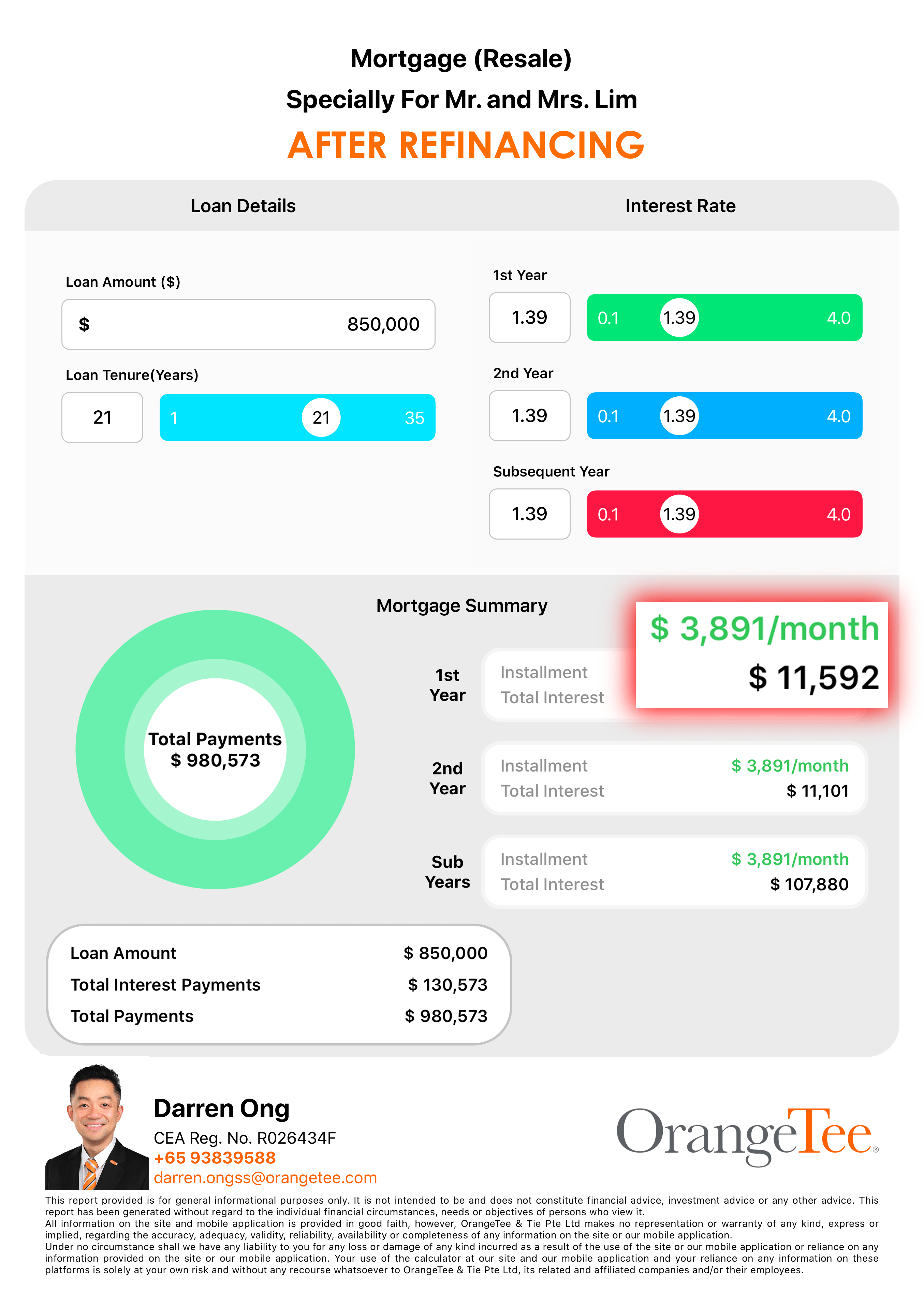
After refinancing to 2 years Lock-In 3-months SIBOR rates package, they get to enjoy a $608 reduction of monthly installment from $4,499 down to $3,891. In short, they save $7,296 per year or $14,592 in 2 years.
Continue Reading
You must be wondering some of the terminologies that I have used, such as Lock-In, refinancing, repricing, fixed rates Sibor rates, etc. Lets me explain in summary below:
Refinancing or Repricing
When you switch your home loan package from existing bank to another bank for your property, this is referred to as Refinancing. This process usually takes up to 3 – 4 months to process.
If you are getting a new home loan package with the same bank for the same property, this is referred to as Repricing. This process usually takes up to 1 month to process.
Therefore, if you intend to refinance or reprice, you can start to look for new packages 3-4 months for refinancing or one month for Repricing before the lock-in period ends.
Do note that Total Debt Servicing Ratio (TDSR) and credit assessment applies.
Example:
If you change your HDB loan (Current 2.6%) package to a Bank Loan (typically lower for the first three years) package. You are performing a Refinancing.
If your current home loan is from Bank ABC and you decide to change to a new home loan package for the same property with Bank ABC. You are performing a Repricing.
The typical cost for Refinancing and Repricing is as following:
– Repricing cost: usually, the bank will charge an admin fee, which can range between $500 and $1000.
– Refinancing cost: there will be legal and valuation fees as you are establishing a new home loan with a new bank. The price usually can range between $2000 and $3000. But if the loan amount is substantial, the bank may offer subsidies to help to minimize these costs.

Lock-in Period
When you take up a home loan package, this is one of the standard terms and conditions you need to take note; The lock-in period is usually 2 or 3 years. It means you need to stay with the bank with the same home loan package within the lock-in period. Otherwise, you will need to pay a penalty fee, usually 1.5 percent of the outstanding loan amount.
Subsidy Clawbacks
You will also need to take note that if the bank offers your some form of subsidies for legal and valuation fees, etc., there is usually a clawback period of around three years. You will need to repay the subsidies if you attempt to refinance during this period.
In addition to the above terminology, different interest rates offered also use different terminologies. Below is some of the commonly used interest rate in Singapore.

Fixed Rates
Fixed rates home loan packages will have their interest rates fixed between 1- 5 years. If you are someone who likes stability and doesn’t like to bother too much on the interest rates, you should go for this.
As of the current context, there is no fixed rate home loan package for building under construction (BUC), the new launch properties.
You may take up the floating rates package first, then switch to fixed rates package after your property obtained TOP.
SIBOR-Pegged Rates
SIBOR refers to the Singapore Interbank Offered Rate. It is the interest rates used by banks in Singapore when they borrow from each other. The SIBOR-pegged rates package has its interest rates made up from SIBOR + Spread = Interest Rates.
The spread is used across all banks to determine the final interest rates for the home loan package. Usually, lower SIBOR rates will equate to higher spread being used by Singapore banks.
But even with the spread percent add on, the SIBOR-pegged interest rates are usually lower than the Fixed Rates package.
Board Rates
Board rates are usually set by the bank, and it can change any time of the year, generally giving you 30 days’ notice. In comparison, Fixed rates and SIBOR-pegged rates have more rates transparency as we do not know how the bank internally determines the board rates and what are the benchmarks used to fixed these rates.
Fixed Deposit Home Rates
Lastly, we have fixed deposit home rates in short FHR home loan packages. As the name implies, it is pegged to the current fixed deposit rates that the bank offered. It is similar to the SIBOR-pegged rate, where there is a spread percent too. Thus FHR interest rates are made up of Fixed Deposit Rate + Spread = Interest Rates.
It is also considered a more transparent interest rate package as compare to the board rates package because the bank needs to publish the fixed deposit rate, and it is controlled by the Monetary Authority of Singapore (MAS) to keep in control. Furthermore, it is tied to fix deposits, meaning if the bank increases the fixed deposit rates, they will have to pay more interest to their fixed deposit account holders as well.
What NEXT Now?

As I have advised my clients, relook into your home loan now as the current interest rates are very low. If you are holding on to a higher interest rate home loan package, you should seriously consider doing a refinancing or repricing of your home loan.
If you are not sure whether it is financially beneficial to you for refinancing or repricing, do drop me a message for a non-obligatory friendly discussion. I can help you to work the sum out.
If you are ready to execute the refinancing or repricing plan, I do have a panel of bankers, and lawyers whom I work closely with that can assist you as well.
Lastly, if you intend to buy property, there should be a good deal out there to grab, and ride on the current low-interest rate.
Hello, I am Darren Ong
As a real estate professional, my duty is to help my clients achieve financial freedom and grow their wealth through Property Wealth Planning™.
I believe that with prudent strategies and a clear investment road map, anyone can enjoy a life of abundance and financial stability.

Darren Ong (王伟丞)
Associate District Director of Huttons Asia Pte Ltd
CEA Registration No.: R026434F
Agency License: L3008899K
Contact: +65 9383 9588




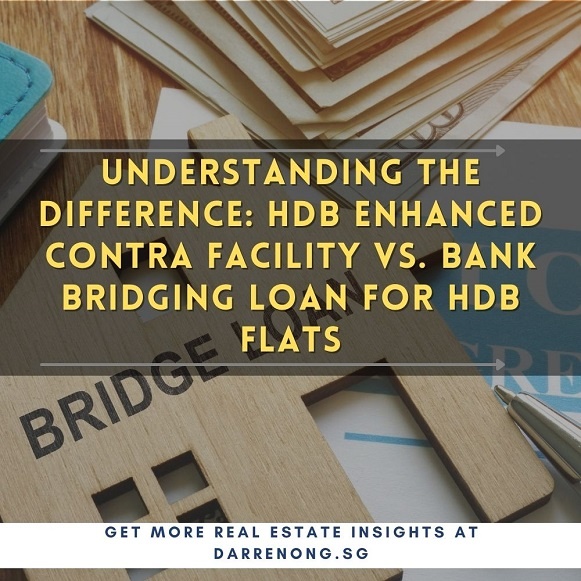






Comments are closed.